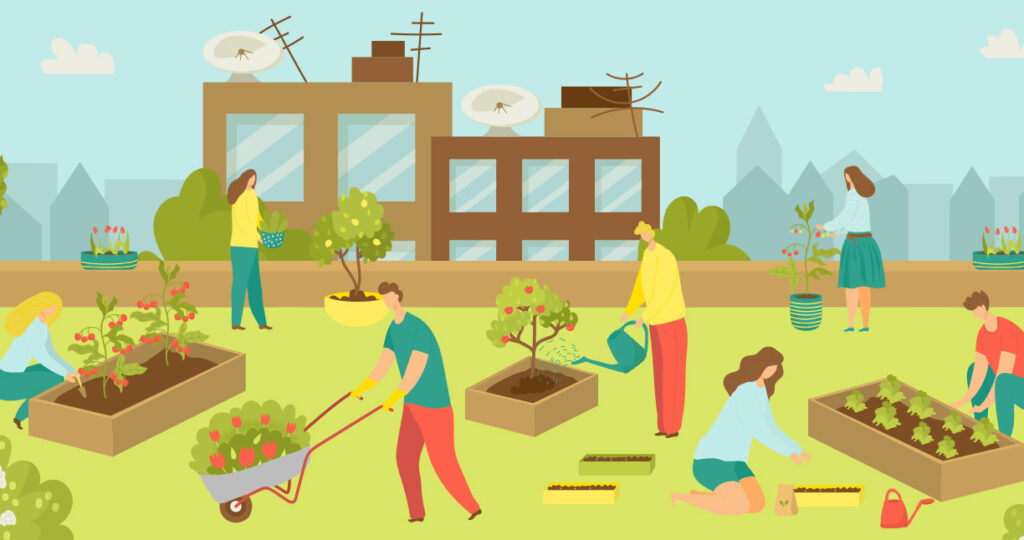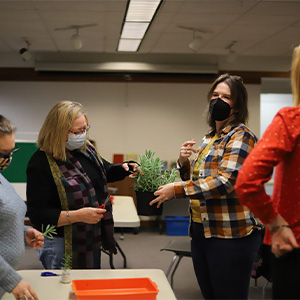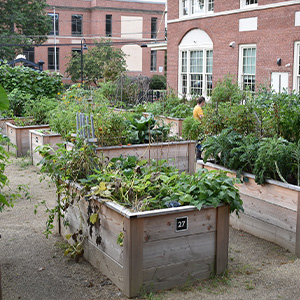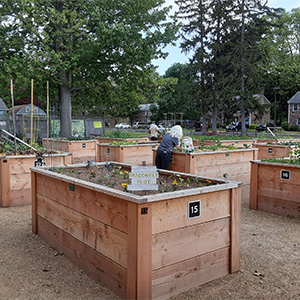Food Sovereignty and the Spruce Street Community Garden

As the world deals with the continuing effects of the pandemic, rising food prices have added to already existing food insecurity here in Manchester and across the country. The solution to this problem is immense, but those at the Spruce Street Community Garden believe that food sovereignty is a part of it.
Food sovereignty began as a movement in the late 90’s by the international peasant group La Via Campesina. The principles of the movement were summed up at the International Food Sovereignty Forum in 2007. Its Declaration of Nyéléni states, “Food sovereignty is the right of peoples to healthy and culturally appropriate food produced through ecologically sound and sustainable methods, and their right to define their own food and agriculture systems. It puts the aspirations and needs of those who produce, distribute and consume food at the heart of the food systems and policies rather than the demands of markets and corporations.”
Here in Manchester, Beth MacDonald is putting those ideas into practice with the Spruce Street Community Garden. MacDonald began working in gardening in 2016, volunteering at a community farm in Simsbury where she eventually began working with children in their summer camp.
“The experiences of being able to be in the garden beds for children was not only educational but it was profoundly therapeutic. And I said there’s something here that I’m gravitating towards, so I did more professional development on my end, traveling around the country, learning as much as I could about what it means to be a farm-based educator, to connect people with their food, because believe it or not there’s not just one of me, there are hundreds of me that are throughout the country.”
Since 2019, MacDonald has worked with the Town of Manchester doing programming for Nature Explorers, as well as Rec on the Run. In October of 2021, she became the Community Garden Coordinator, and through the garden and learning events for adults and children, she hopes to put those principles into practice.
According to the U.S. Food Sovereignty Alliance, food sovereignty is based on the principles of focusing on food for people, valuing food providers, localizing food systems, putting control locally, building knowledge and skills, and working with nature to be ecologically friendly and sustainable. Focusing on food for people “puts the right to sufficient, healthy and culturally appropriate food for all at the center of food agriculture, livestock and fisheries policies.” Such an approach seeks to fix what’s wrong with today’s food systems.

“What I learned from my volunteering experiences, whether it was on the farm or volunteering for Foodshare, is that our food system is profoundly broken,” MacDonald said. “Food has also like so many things in our world become a source of privilege, and how much you make as far as income tends to dictate the quality of the produce and the food that you can get at home. And we have a high amount of food insecurity here in our state. Our most vulnerable populations are the elderly and children.”
Through the Spruce Street Community Garden, Manchester residents who might not otherwise have the space are able to grow their own food, while educational events for children and adults teach skills in gardening and the value of healthy, nutritious food. Combined, these efforts seek to educate and provide resources for individuals and families to reclaim their place in the food system.
“Being able to grow you own food not only is empowering on a level of self-confidence and feeling like self-efficacy, which I’m really big about fostering, this idea that like ‘I can do this, I can make things happen in my world…’” MacDonald “It saves you a huge amount of money in your household budget, and it also makes you, as far as an individual or a family, more resilient.”

According to NBC News, grocery prices rose 7.4 percent, with the inflation rate at a 40-year high. Being able to grow some of your own food can help offset prices of food that leave many struggling to afford healthy and good-quality food.
“If you can grow your own vegetables, it changes the game a little bit. It makes it a little bit more of a level playing field…” MacDonald said. “It still will impact you, these changes in our economic foodscape, however, you’ll be a little bit more resilient to it because if you’re going and harvesting your kale from your back yard or from your community garden bed it’s still healthy nutritious food, it’s never something that you’re going to have to worry about. You’re not going to have to worry about how to feed your family or feed yourself, which is a basic human need. So that’s why I kind of feels like it’s important that we’re able to do this in our parks and green spaces.”
A strong element that MacDonald wants to encourage is growing culturally relevant foods, especially as Manchester increasingly becomes a more diverse community with members coming from a wide variety of cultures and culinary traditions.
“We should be allowing people to grow what they feel like is best for their bodies and what’s healthiest for them to consume…” MacDonald said. “At the end of the day, part of food sovereignty is being able to grow something that is relevant to you and your household. It honors the cultural traditions.”
Bringing together the knowledge and skills of different cultures in their growing practices and culinary styles and sharing them within the community garden fulfills another principle of food sovereignty. Knowledge from past generations, and the human stories that go along with them, are preserved and put to use.
“[It] adds a level of beauty and enhancement to the community and to the gardening experience just overall,” MacDonald said. “Makes us feel more connected.”
The Spruce Street Community Garden also seeks to be sustainable and ecologically friendly, and MacDonald is continuing to educate herself on sustainability measures. These practices are not only more beneficial to the environment but can be more economical in terms of cost.
“There are ways to do it that are not only cost-effective but definitely more sustainable,” MacDonald said.
The Community Garden has collected rainwater to prevent it from becoming runoff and wasted and has a composting system where people are welcome to drop off things like plant material, coffee grounds, and eggshells for reuse in growing new plants and vegetables. The garden follows all-natural practices, using natural bug repellents and fertilizers instead of chemical fertilizers, pesticides, and weed killers. These methods being both sustainable and cost-effective also reduce the privilege attached to the expensive synthetic options, according to MacDonald.

Sourcing your food locally, whether from a community garden, your backyard, or a local farm, is not only healthier but more sustainable, as the food has to travel a much shorter distance to get from the farm to your table. The price in the store doesn’t show the environmental cost of all the steps that got the food onto the shelves.
“Sustainability can also look like buying from your local producers, which on the forefront may look more expensive to a household, but in the long-term end of things it also is supporting our local communities, supporting our local food providers, and actually providing us with food that’s actually more nutritious,” MacDonald said. “Because as food travels and the time from the time it is picked or plucked, it starts to lose its nutrient density, so the faster it gets from the farm to your fork the more healthy, nutritious, and sustainable it is, not only for the environment but also our bodies and our families.”
As MacDonald enters into her first growing season, she has plenty planned for those looking to get involved in growing their own food through renting garden beds and low- or no-cost gardening and nature-based programming for children, adults, and families, as well as plans for a children’s sensory and educational garden. MacDonald also continues to seek out community partnerships to further advance food sovereignty in Manchester. All of these measures work towards a common goal:
“To create a more equitable food system here in Manchester,” MacDonald said.
Like this article?
Leave a comment
About Author

Anthony is a staff writer for Better Manchester. He attended school in Manchester for many years, and recently graduated from Boston College with a B.A. in Political Science and Philosophy.
Fun Fact #1: I am a die-hard fan of the English Premier League club Arsenal F.C.
Fun Fact #2: I’ve met Danny DeVito, and yes, we took a picture together.
